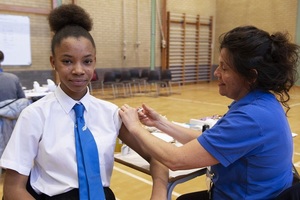HPV vaccine drives cancer causing infections down to very low levels
The latest PHE data confirms that HPV16 and 18 infections are now at a very low level in young sexually active women with high vaccination coverage.

School girl being vaccinated in the arm.
Cancer-causing HPV16 and 18 infections are now extremely uncommon in young sexually active women in England, following the introduction of HPV (human papillomavirus) vaccination in 2008.
These infections were found in less than 2% of 16 to 18-year-old women between 2014 and 2018, new data from Public Health England (PHE) show. In a sample of 584 young women tested in 2018, no HPV16 or 18 infections were detected.
This is a dramatic reduction from 2008, when over 15% of young sexually active women were found to have these infections.
Marta Checchi, Senior Scientist, Public Health England, said:
This is now the fifth year of finding less than 2% of young sexually active women infected with HPV16 or 18. These new data demonstrate the huge impact of the vaccination programme in its first 10 years.
Cervical cancer is currently the most common cancer in women under 35, killing about 850 women a year.
HPV causes 99% of cervical cancers and types 16 and 18 are responsible for around 4 in 5 cases. The virus can also cause anal and penile cancer and some types of head and neck cancer.
The prevalence of HPV6 and 11, which cause 90% of genital warts, also fell for the first time in 16 to 18-year-old women, from fluctuating around 7% to 10% between 2010 and 2017, down to 4% in 2018.
Dr Vanessa Saliba, Consultant Epidemiologist, Public Health England, said:
This is clear evidence of the success of our immunisation programme, which continues to achieve high coverage.
With millions of young women protected by HPV vaccination, we expect to see big reductions in cervical cancer in years to come and the introduction of the boys’ programme will accelerate this progress.
I encourage parents of all eligible girls and boys to ensure they take up this potentially life-saving vaccine when offered.
Nicola Blackwood, Health Minister said:
Thousands fewer women and men will be diagnosed with cancer as a result of the HPV vaccination programme and declining infection rates.
Our world-leading vaccination programmes are vital in protecting young children and preventing the spread of a host of awful diseases. It’s incredible to think that this vaccination is helping us eradicate cervical cancer for good.
The national HPV vaccination programme was introduced for girls in 2008 and extended to boys in 2019. The current vaccine protects against HPV16, 18, 6 and 11.
The prevalence of 3 other cancer-causing types, HPV31, 33 and 45, has also declined, suggesting the vaccine provides substantial cross-protection.
The first dose of the HPV vaccine is offered to 12 and 13-year-olds in year 8. The second dose is given routinely anytime between 6 to 12 months after. Two doses are needed to be fully protected.
The latest PHE statistics show that 83.9% of year 9 girls had received both doses in 2018 to 2019. Eleven million doses of the vaccine have been given to young women in England, meaning over 80% of women aged 15 to 24 are protected.
The success of the programme is thanks to hard work and collaboration across the health sector, including the NHS and local government.
Young people who missed the vaccine when it was offered to them at school should talk to their school nurse or GP to arrange getting caught up without delay. They remain eligible until their 25th birthday.
It is important that women who have had the HPV vaccine still attend cervical screening when invited as the vaccine does not protect against all types of the virus.
Professor Peter Johnson, NHS national clinical director for cancer said:
Eligible people should go and get this vaccine, which has been incredibly successful in driving down infections that cause cancer, and which is a potential life saver for millions of young women and men, protecting them from a range of cancers.
Thanks to a range of action set out in the NHS Long Term Plan and the new way of screening for cervical cancer which is now in place across the country, we hope that cervical cancer can be eliminated altogether, building on recent progress which has seen record-high cancer survival.